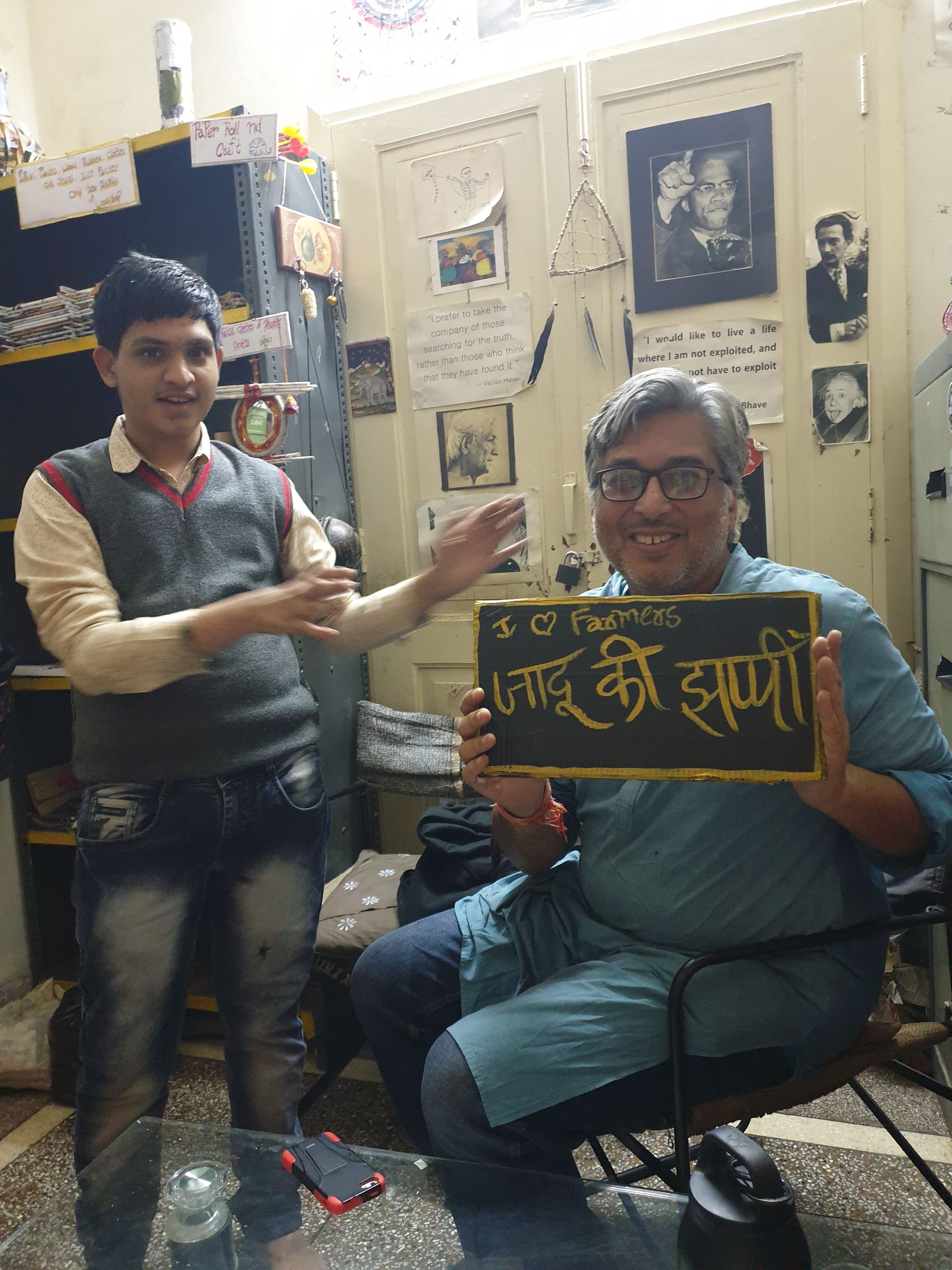An overview of three self directed learning organizations lead by the activist and thought leader Manish Jain. Inspired by Gandhi's vision of Swaraj for an autonomous society, these organizations are living experiments on self determination, empowerment, gift economy and community.
During a visit to Udaipur, Rajasthan I had the pleasure of spending a couple days with the educational rebel and community leader Manish Jain. He has been living for about two decades following the principles of gift economy. In practical terms this means that he offers his services with no fixed charge. Instead, a relationship of trust is built between the giver and the receiver of the “gift” and there is an implicit understanding of mutual reciprocity. In other words, the receiver of a gift asks for his services, for example a talk, a lesson or an event, then Manish provides this service as a gift and then the receiver of the gift is expected to reciprocate accordingly. When costs are associated with a gift, for example an airplane ticket, the receiver is expected to cover that upfront. But for the service itself, or the gift, the response is voluntarily determined by the receiver. This principle of trusting the receiver of your gifts and not fixing a price upfront is a true act of confidence and interdependence. The gift economy principle is also applied to the projects he co-founded and leads.
In the gift economy, the more you give the richer you are
— Charles Eisenstein
Manish has been a long proponent of redefining education away from factory schools into “recognizing the infinite potential of each human being; and enabling people to continuously 'learn, unlearn, and relearn' by developing their capacities for deep thinking, reflecting, feeling, understanding, sharing, creating, and taking personal responsibility”
Shikshantar The Peoples' Institute for Rethinking Education and Development
Shikshantar is a movement operated from an “Unlearning Center” where children and teens are welcomed to spend their days and create a self directed learning experience. In some cases the kids face big life challenges like a mental health disorder or being an orphan. They can also be school dropouts that did not fit the educational system or simply children going after school to have the opportunity to explore education in a different way.
The center has a library, cinema center, organic gardens, musical instruments, kitchen, art materials and an upcycling station. It counts with the support of a small group of committed adults trusting the kid’s interests and thirst to learn. During my visit I tried to have a one on one talk with Manish to hear about their methodology and vision but found our conversation interrupted about 100 times an hour by enthusiastic kids that wanted to show him their latest creations, resolve a dispute, get advice, ask for money to buy new pants, crack a joke or just hang around. Meanwhile, the facilitators of the center also had questions and updates for Manish, add to that a few visitors that came in to talk to him and consult on other events they were organizing together. Not to mention that the phone rang about 10 times. I was overwhelmed by the amount of topics, consultations, kids, noises and interruptions. Meanwhile, Manish was completely at peace, giving every single soul the same sincere and kind attention he was giving me, celebrating each small accomplishment that people came to show him and evidently having fun at it!
Swaraj University
Swaraj (self-rule or rather, rule over oneself) is inspired by Gandhi's Hind Swaraj, a call for people to lead and create their own models of development that are holistic, pluralistic, sustainable, liberating, collaborative, socially just, and anticipatory.
Hidden away half an hour south of Udaipur’s city center is an ashram that serves as a campus for Swaraj University. The university offers a two year program where roughly 15 students at a time go through a process of exploration and discovery. The students and a small group of facilitators live on campus and undertake the journey together. Students stay for a few weeks at a time on the campus defining and exploring their interests. Then they go out to practice, learn and explore their interests within a support network of people, organizations and businesses that are already working in their field of interest. After a few weeks out they come back to the campus, share their lessons, reflect and continue their journey.
The students are free to explore their interests and self direct their learning journey as long as they focus on community oriented and ecologically minded projects or inquiries. The campus has many organic gardens, bioconstruction buildings, stunning landscapes and open classrooms as a result of previous alumni’s explorations.
Swaraj University also works under the principle of gift economy. They disclose the operational costs to the parents and students to have a reference on what it takes to make the program happen. Then the program is offered as a gift, and therefore, students pay whenever and as much as they decide to reciprocate. The university also receives donations from the support network of allies, alumni and the wider community.
Swaraj Jail University
Following the same principles of the Swaraj University, Manish with the help of Diken Patel, an ex financial analyst turned into an educational rebel, opened an educational program at the local jail. They support a group of inmates into their self directed learning journey. The inmates are learning organic farming, yoga, computer tools, photography, filmmaking, painting and music. As a result more than 50 murals have been painted inside the prison. One group decided to explore music and practice 6 hours every day. I had the pleasure to hear their performance at the Organic Farmers Association of India’s national congress. The music was beautiful, and the love and appreciation that they publicly expressed to Diken and Manish was heartwarming. The love and support of the crowd towards them was also extremely inspiring.
When I asked Diken about his job description, his answer might as well describe the essence of what I saw in all projects inspired by Manish:
“To make sure that love is the driving force behind everything we do!”

